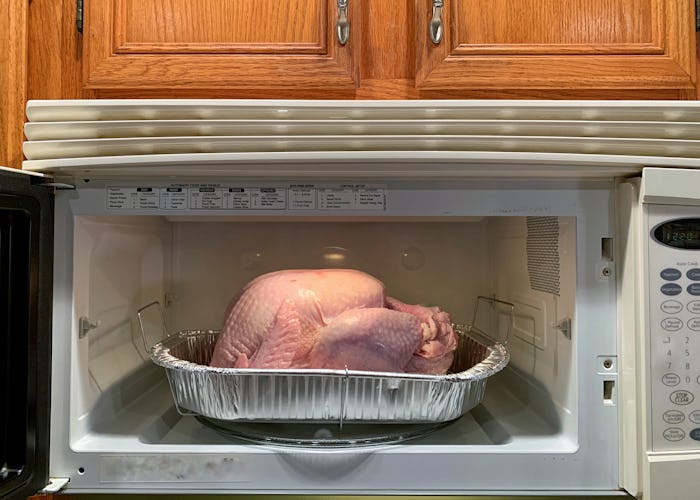Life

When you're responsible for the main dish on Thanksgiving, it's normal to feel a little nervous about your big role. That's why there's a hotline to help solve your real life turkey disasters: Thanks to Jennie-O, you can dial up a real-life professional chef to talk you through your personal kitchen nightmare.
A total of 11 total chefs will be available to chat until 11 p.m. on Tuesday, November 26 and until midnight on Wednesday, November 27. The hotline staff will also be available until 11 p.m. on Thanksgiving Day. (The hotline is actually open through December 1 but chefs will only be available through tomorrow.)
Last year, Jennie-O provided the same service to skittish cooks for the holiday... thousands of them. The 1-800-TURKEYS hotline ended up fielding more than 10,000 calls that month, according to a rep for the company. Over the course of those calls, the team compiled a list of some of the most common (as well as some of the most unique) questions they received. This year, in an effort to help out families ahead of time, they've answered five of the questions up-front for Romper.
Each question has been answered by Chris Anderson, Consumer Engagement Specialist at Hormel Foods. And while some might seem a little bit on the outrageous side, remember that roasting a turkey can be a lot trickier than it seems. From thawing to dressing to storing, the traditional holiday birds come with their own set of rules, and they're easier to break than you might think. (And if you're way too intimidated to try, don't worry. You can always go the turkey breast route, or skip the meat and have a tofurky feast instead.)
1
Turkeys Don't Need Baths
Last year, 1-800-TURKEYS fielded this question: "I tried to wash the turkey in soap... is that bad?" Anderson likely had to take a deep breath before answering this one, because, as he puts it: "Soap infusions are not really in this year."
Essentially, the chances of you being able to completely rid the turkey skin of the soap is slim (and the soap will then affect the taste of the finished product).
"Any extra contact with raw poultry is an opportunity for salmonella to spread, so we do not recommend washing or rinsing a turkey," he adds.
2
It's A Turkey, Not A Football
Turkeys are usually kept in a freezer until it's time to prepare them for the big day, but since they're so large they need a lot of time to properly thaw before they can be cooked. One person didn't realize how much time it takes to thaw a turkey and asked the hotline if "rolling it around in dirt" would help it thaw faster.
"Just because grandma did it, doesn’t mean you should," says Anderson. "You’ll want to thaw that turkey in the refrigerator to make sure it stays at a safe temperature. Add some unique flavor with seasoning instead."
Much like soap, dirt isn't exactly a traditional turkey marinade.
3
Seat Warmers Aren't For Turkeys
One innovative caller inquired whether or not a heated car seat was a good way to speed up the turkey thawing process. As expected, Anderson doesn't suggest this method.
"Heated seats are going to get the outer meat to an unsafe temperature while the center is still cool," he explains.
If you're traveling somewhere, and are responsible for bringing the (raw) turkey, he recommend thawing it in the refrigerator ahead of time and bringing it in a large freezer bag or cooler.
"If you don’t have a cooler large enough, look to have someone closer to your destination thaw they turkey in their refrigerator," he says.
4
2-Year-Old Frozen Turkey Is Like A Fine Wine
If you snatched up a turkey at a steep discount the day after Thanksgiving last year and stored it in a freezer, you can actually still use it. Whole turkeys are good for up to two years in the freezer, Anderson says. If you're also serving ham, he notes, the same rule does not apply: "Those are only good for a few months in the freezer."
5
Just Purchase A Meat Thermometer, Please
Last year, one caller asked: "Can I check the internal temp with a child's fever thermometer instead of a meat thermometer?" Anderson's first response is a counter-question: "Do you know where that thermometer has been?" Aside from that (very valid) point, he explains that "different thermometers are designed for different uses, and you need one that is going to read the internal temperature of that turkey. These days you can get a fast read digital thermometer that will give you the answer you need in seconds."
Essentially, it might seem silly to invest in some of these tools for a once-a-year dish... but please, just do it.
Editor's note: This post has been updated from its original version.